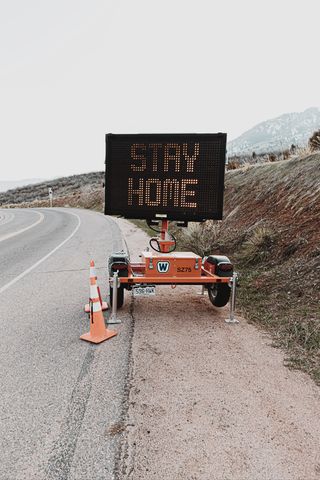Anxiety
How to Stay Positive During the Pandemic
Our anxiety can lead us into some dark mental spaces.
Posted March 29, 2020 Reviewed by Matt Huston

If you told me a year ago I’d be writing an article entitled “How to Stay Positive During the Pandemic,” I’d probably laugh it off as a hyperbolic framework to talk about positivity. Who knew this is where we’d be?
If you’re like me, your life has been turned upside down by the COVID-19 outbreak. Work is different. Any social life has ground to a halt. “Social Distancing” is suddenly a word that we know and hear daily. Fear and uncertainty are rampant.
Anxiety thrives on the unknown. By and large, despite all the ups and downs geopolitically, we’ve all become accustomed to relative stability and predictability. Now, however, our changing world all but ensures waking up to a new set of rules, limitations, and changes.
After a certain point, our anxiety can lead us into some dark mental spaces. The anxious brain, in a desperate effort to attain some sense of certitude, fills in the uncertainty with worst-case scenarios, even if these scenarios are based on the flimsiest information. While it does this to keep us alert to potential dangers, hoping we’ll see them coming and avoid them, it can very often lead us into panic, avoidance, rash decisions, or falling into a hole of sadness.
If you’re like me, you might sometimes fall into the latter camp. Depression and anxiety go hand-in-hand. If all we can think of are terrible outcomes, failure, and struggle with no sense of escape or agency, of course we feel depressed. It saps our energy to work, it constrains our sense of hope that things will get better, and it overpowers our rational state of mind.
There is hope. Despite your anxious brain’s effort to highlight the terrible, and despite your depression sucking any sense of optimism from the day, you can find hope in the midst of the pandemic. With some intentional effort, you can learn and practice several skills that will boost your sense of confidence despite the crisis, nurture optimism, and build emotional flexibility so you can handle instability.
Focus on what you can control
Fear and depression can make you feel powerless. Additionally, your anxious brain and depression can conspire against you to highlight how your life is worse and limited. “You can’t see your friends.” “The stock market is taking a nose-dive along with your retirement.” “I’m so scared I can barely breathe!”
While you cannot control your feelings, your thoughts, or the actions of others, you are not powerless. Shifting your attention toward those aspects of life that you can control can help restore your sense of agency and self-confidence.
Things in your control can be as simple as your daily and nightly routine, what you eat, and what you wear each day. They can also be as profound as how you speak to yourself, how you’ll pursue your beliefs and goals, and how you’ll respond under pressure. Whether they be big or small, mundane or extraordinary, challenge yourself to make a list of all the things within your control. I bet you’ll surprise yourself with how much will be on that list.
Limit your media intake
In order to get ahead of the virus and be up-to-date on the CDC’s and WHO’s recommendations, you may be glued to your phone, TV, or computer. Of course, we all want information and guidance on what we can do to keep ourselves and family safe, but the amount of information can be a double-edged sword.
My mom used to say, “Beware, little eyes, what you see. Beware, little ears, what you hear.” She’s never been righter. Surrounding yourself with infection rate statistics and stories of hospitals being short on medical supplies because of selfish hoarders can take its toll. If that’s 100 percent of the information in our head, that’s 100 percent of the truth to you.
Limiting how much time you spend watching the news, listening to the radio, and scrolling through social media can help restore a sense of normalcy while reducing your sense of dread. This doesn’t mean putting your head in the sand, but being knowledgeable and respectful of your own emotional and psychological limits.
If you start to notice yourself getting agitated, fearful, or depleted when you’re seeking news, then it’s time for a break. Very likely, the general guidelines of “wash your hands” and “maintain social distance” will not change if you take a few hours to disconnect.
Remember that people are still working to make it get better
After some time in quarantine and being surrounded by bad news, you can start to believe that nothing is getting better, thinking things like: “The government isn’t helping,” “Doctors don’t know what they’re doing,” or “People don’t respect the health guidelines.”
At the risk of sounding like a cliché, we can find hope in the oft-quoted line from Mister Rogers, “When I was a boy, I would see scary things in the news, my mother would say to me, ‘Look for the helpers. You will always find people who are helping.’”
There are stories of police officers shopping for the elderly, doctors coming out of retirement to lend a hand, and families sharing their food and toilet paper (that’s right, even their coveted toilet paper!) with those in need. Your anxiety and depression can minimize these stories, so it’s your job to seek them out and remind yourself that there are helpers and people who care to make the situation better.
Invest in the uplifting
Surrounding yourself with uplifting media, people, activities, and thoughts can help encourage a more optimistic and joyful mindset, even in the face of stress and loss. For many, this can be difficult, and you should not expect to magically change your thoughts and feelings. But, the more you see, think, and do that reflects peace, happiness, and positivity, the more it can influence your mood and outlook.
I’m sure you’ve heard of “comfort food.” It’s used to help promote a feeling of warmth, joy, and frivolity. It’s not health food, that’s not the point. So, who and what are your “comfort food” people, movies, TV shows, books, or activities? Now’s the time to enjoy them.
Set a personal schedule and goals
Using your time wisely, sticking to a routine, and being productive help promote a sense of hope that you and life are progressing. In the face of occupational and social change, you may lose your productivity and tenacity while falling into idleness and subsequent discouragement.

Instead, take some time to create a new schedule and routine in light of the changing times. While you may be socially isolating and working remotely, you can still get up and get ready for work as you normally had and “commute” to your newly designated home workspace in the corner of the apartment. Make space in your schedule for breaks, lunch, and chatting at the water cooler (texting with friends).
Continuing to take steps toward your personal and career goals can also help you maintain hope throughout all this. This may be through exercise, reading, writing, honing old skills, or acquiring new skills. While the pandemic may have put some things on hold, you should continue to take reasonable steps toward becoming your ideal self.
Do your part
Lastly, if you’re reading this and looking for hope, remember that you are doing your part. You, along with the rest of society, have been asked to come together under extraordinary circumstances to do something out of the ordinary. Participating in the specified safety measures joins you with millions of other people as we work together to protect others and get back to business as usual.
If you’re feeling powerless and hopeless, remember that you can do your part to wash your hands, resist the urge to hoard unnecessarily, stay home unless absolutely necessary, and encourage others to do the same. It may not feel like superhero-level work, but it is superhero-level work to protect your neighbors and those most vulnerable. Your seemingly small efforts add up and make a tremendous impact on your community. They add up. They mean something. Keep moving forward, and together we’re going to all come out of this.




